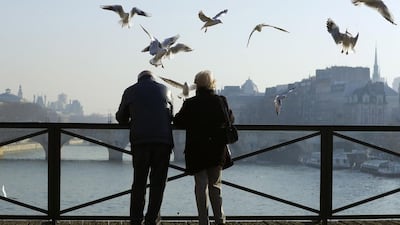There is a universal desire in all socio-economic groups in the world’s 196 countries to live good lives for longer. But what is a simple mission statement raises some of the world’s most thought-provoking questions: at what point do our ethics stop pushing our biological limits through experimental science? How much is too much?
Medical and scientific experts unequivocally agree that humans’ average lifespan can continue to rise, but there is little consensus on exactly how much. There are few comparisons. Humans’ current average life expectancy has doubled since 1900 to 71.4 years. This is long when compared to mayfly’s lifespan of one day, short when compared to a 400-year-old Greenland shark and a blink of an eye when compared to an 11,000-year-old deep-sea sponge. Chimpanzees, with whom 98.5 per cent of our DNA is identical, typically live fewer than five decades.
Aubrey de Grey, the chief science officer of the California-based Sens Research Foundation, argues that society has a fatalistic attitude to longevity and that the first person to reach 1,000 years old could already be alive. Elizabeth Blackburn, who won the Nobel Prize in 2009 for research on telomeres and the genetics of ageing, said raising the average lifespan to triple digits is not overly ambitious.
A study by scientists at the Albert Einstein College of Medicine said it may not be possible to extend life beyond the ages that have already been recorded, with 115 years likley to be humans’ maximum average lifespan. The odds that in any given year at least one person in the world will live past their 125th birthday are less than 1 in 10,000. Frenchwoman Jeanne Calment, who was the world’s oldest person having lived for 122 years and 168 days until she died in 1997, may be the record holder for a long while.
Most specialists argue that it is too soon to pin down a maximum lifespan when medical experimentation has so often pushed the boundaries of what we thought possible, even when it challenged ethical norms.
__________________________________
Health debate
This is the first of a three part debate about the potential human lifespan.
Read part two: As human lives get longer, the question is: can we afford it?
Part three: Nicole Sirotin looks at present and future medical advances
__________________________________
Organ transplant and in-vitro fertilisation are two prominent procedures that trigger ethical debates. The idea of organ transplants, for example, was initially criticised by some saying that using human body parts like a robot – swapping and switching functions to make the whole system work – failed to value human life. But, since the first organ transplant in 1954, of a kidney, the vast benefits and manageable risks of the procedure mean it is now largely accepted by society as a normal operation.
Aversions to new medical procedures can stem from concerns over patient care, the necessity of the treatment, an aversion to animal testing, religious beliefs or a lack of confidence in the risk-reward ratio of the treatment. While experimentation is integral to growth, what is the distinction between pioneering care and reckless treatments? Answering this question will prove increasingly valuable in order for the healthcare industry to cope with the 30 per cent increase in the world’s population to 9.7 billion by 2050, especially if birthday celebrations for 115 year olds become commonplace this century.
For example, Italian professor Sergio Canavero is the director of the Turin Advanced Neuromodulation Group and, along with researchers at Harbin Medical University in China, said in January this year that the first successful head transplant using monkeys had been completed. The spinal cord was not reconnected so the monkey, which was euthanised on day one for ethical reasons, was left paralysed. But, Dr Canavero and his team still plan to carry out the procedure on a human by the end of 2017 in the long-term hope of giving mobility to patients who are paralysed or have muscle-wasting diseases.
The radical concept of joining the “mind” and “body” from two different bodies is ethically challenging. Those in some scientific and medical circles appreciate the potential longevity and enhanced lifestyle that a successful patient could experience, but there are concerns that the science is misleading as the nervous system of the “new” being could be redundant. Many experts feel that the procedure would benefit from more research trials before being applied to humans.
Human lifespan is often referred to as a global average. But the World Economic Forum’s 2016 Global Competitiveness Survey said that Hong Kong has the highest average life expectancy, at 84, and a multitude of other data sources point to Chad as having the world’s lowest lifespan at just under 50. Is it right to question the ethical guidelines of living to 115 when millions of people are still not living to see their sixth decade?
Dyala Sabbagh is a partner and COO of Gulf Intelligence. Free tickets for the World's Fair 2020 Debate Series on The Future of Health: The First Person Who Will Live to 150 Has Already Been Born, on Wednesday at NYU Abu Dhabi, can be booked at thegulfintelligence.com

